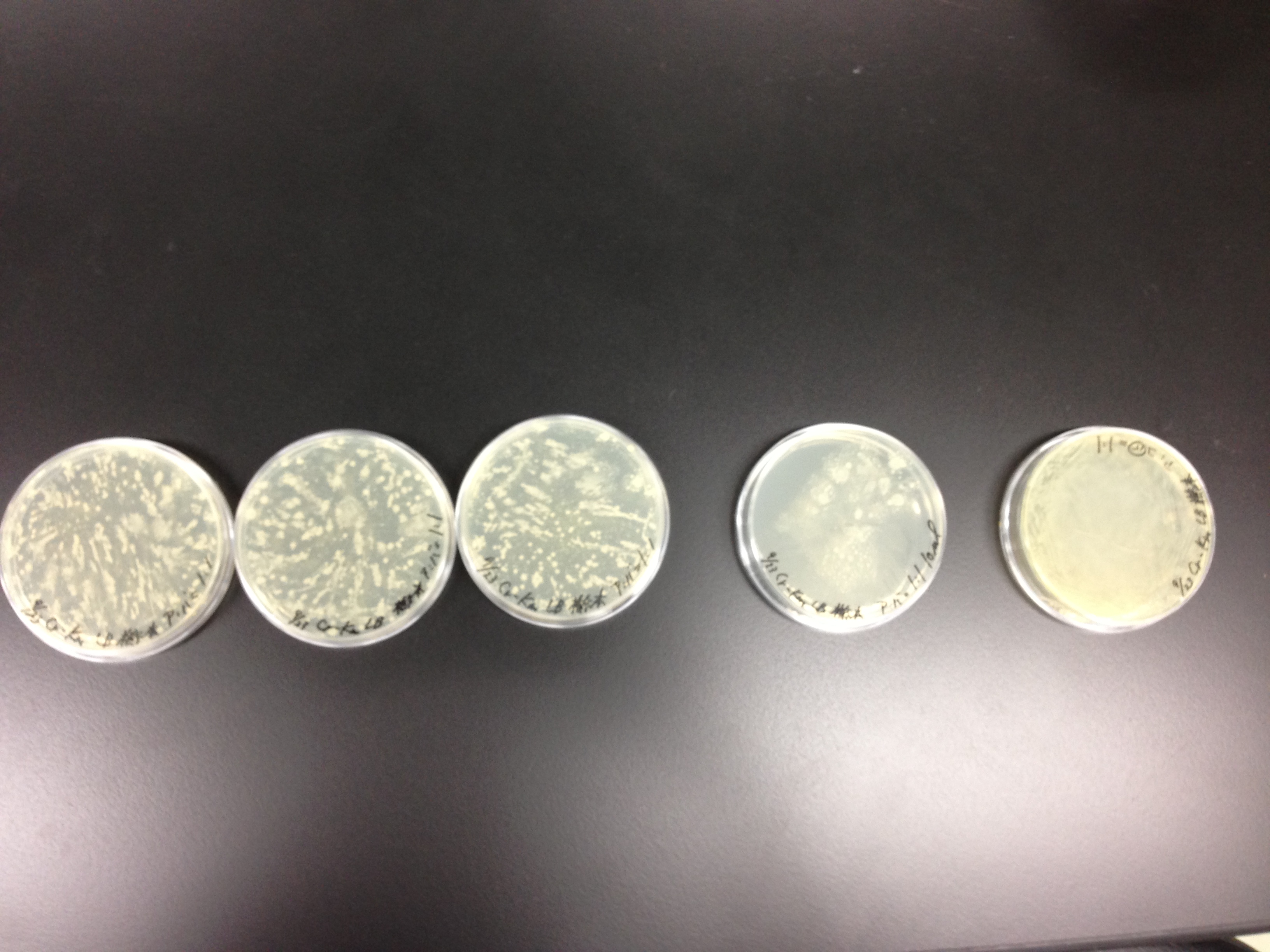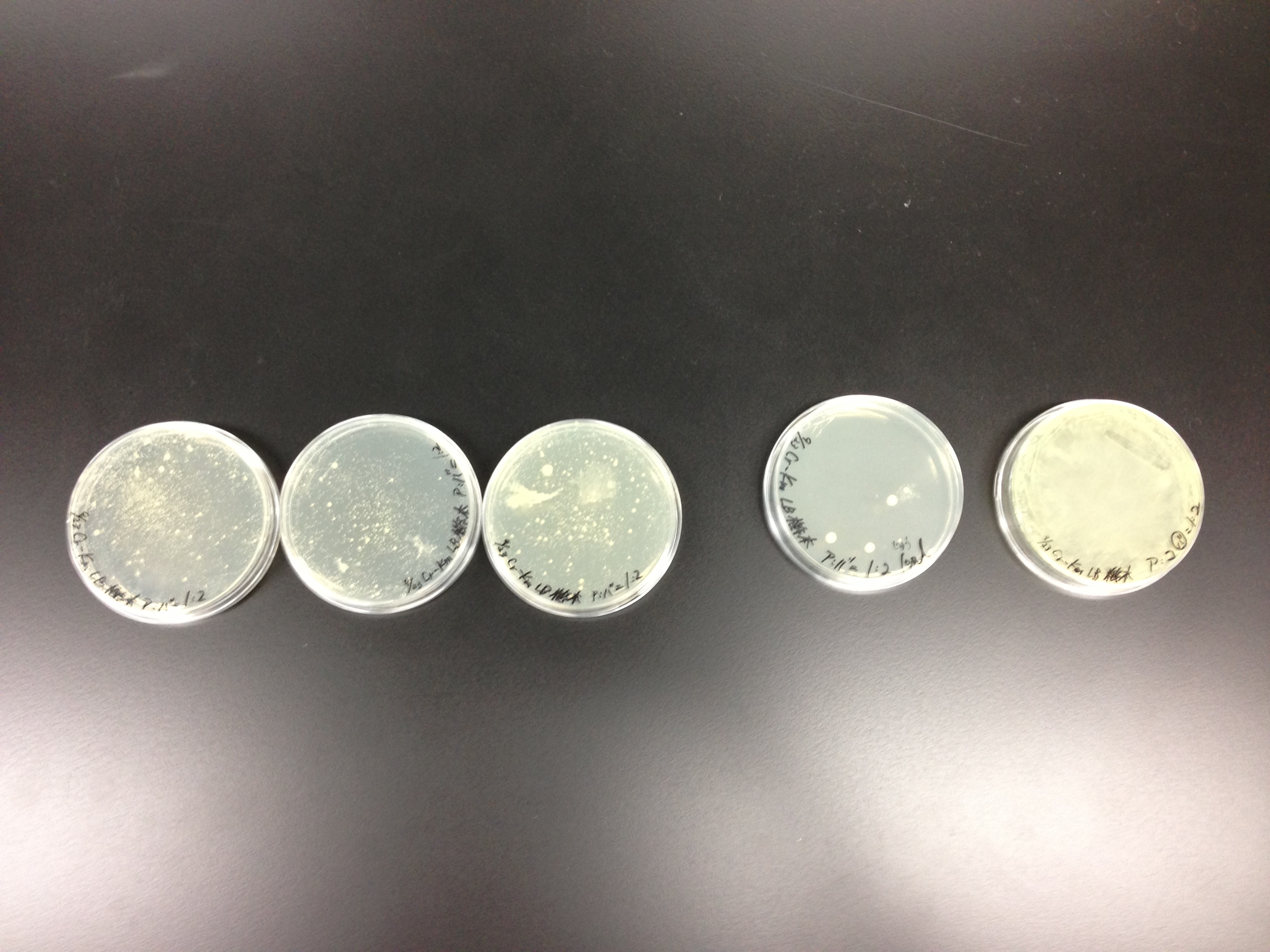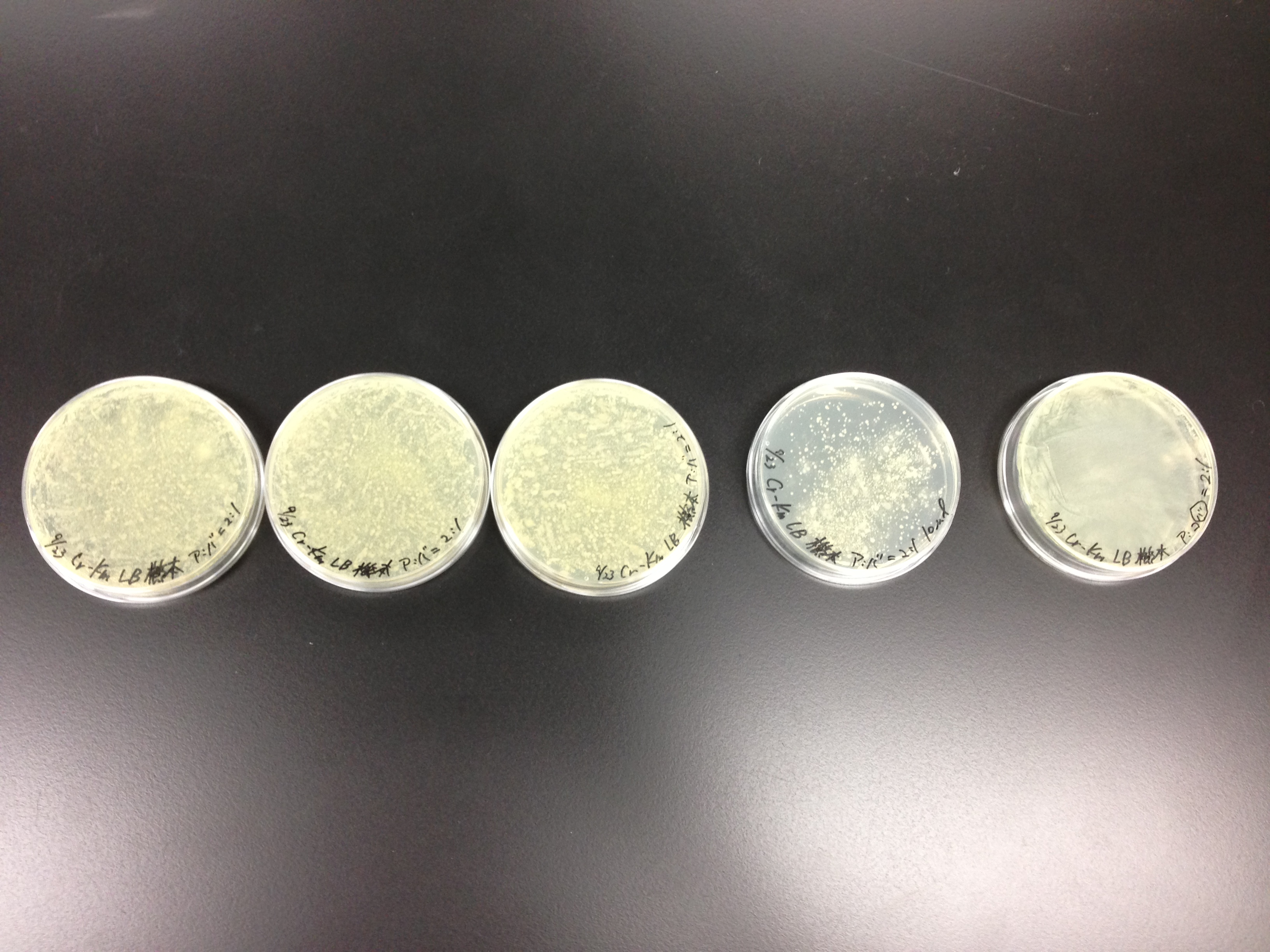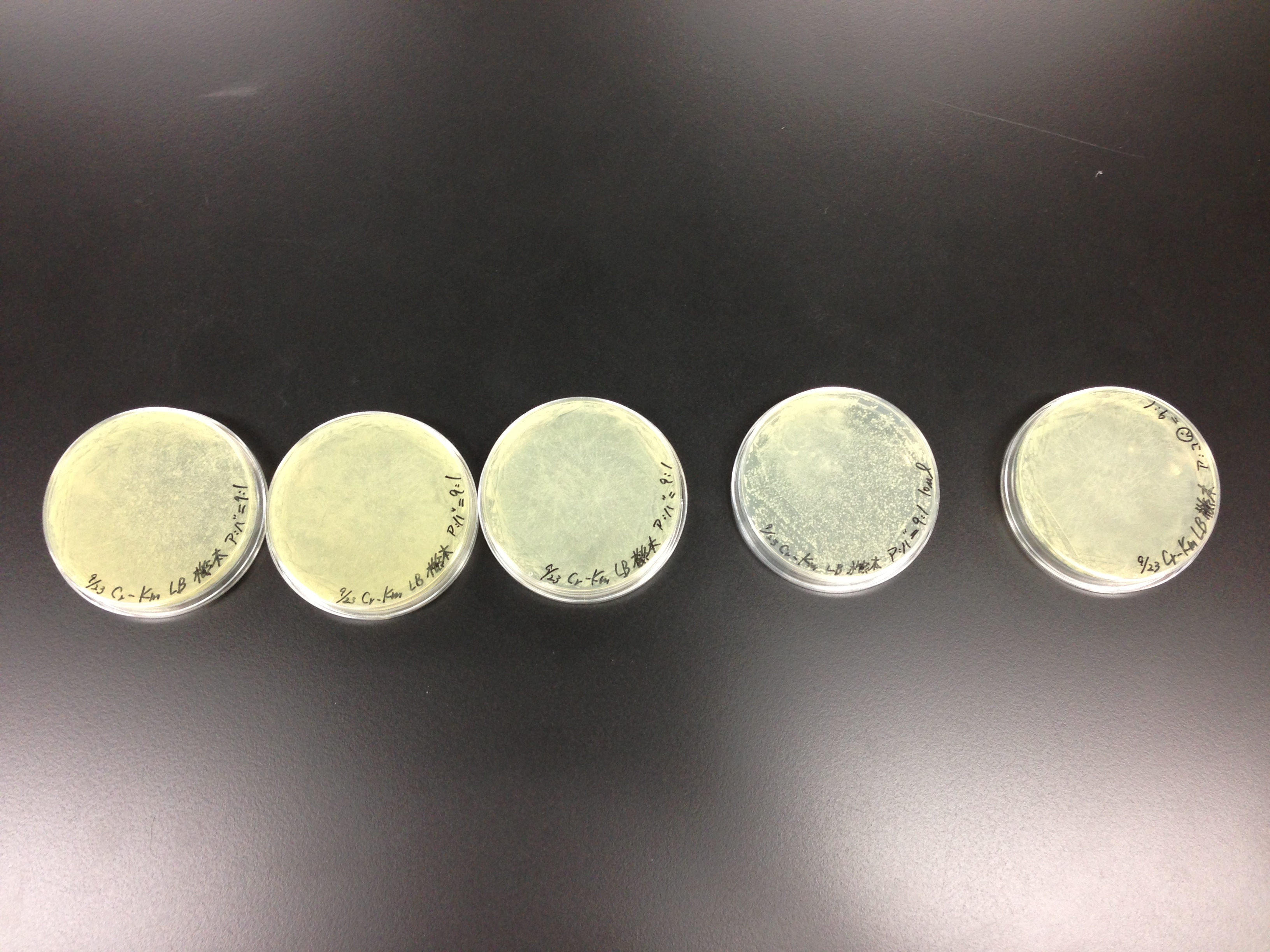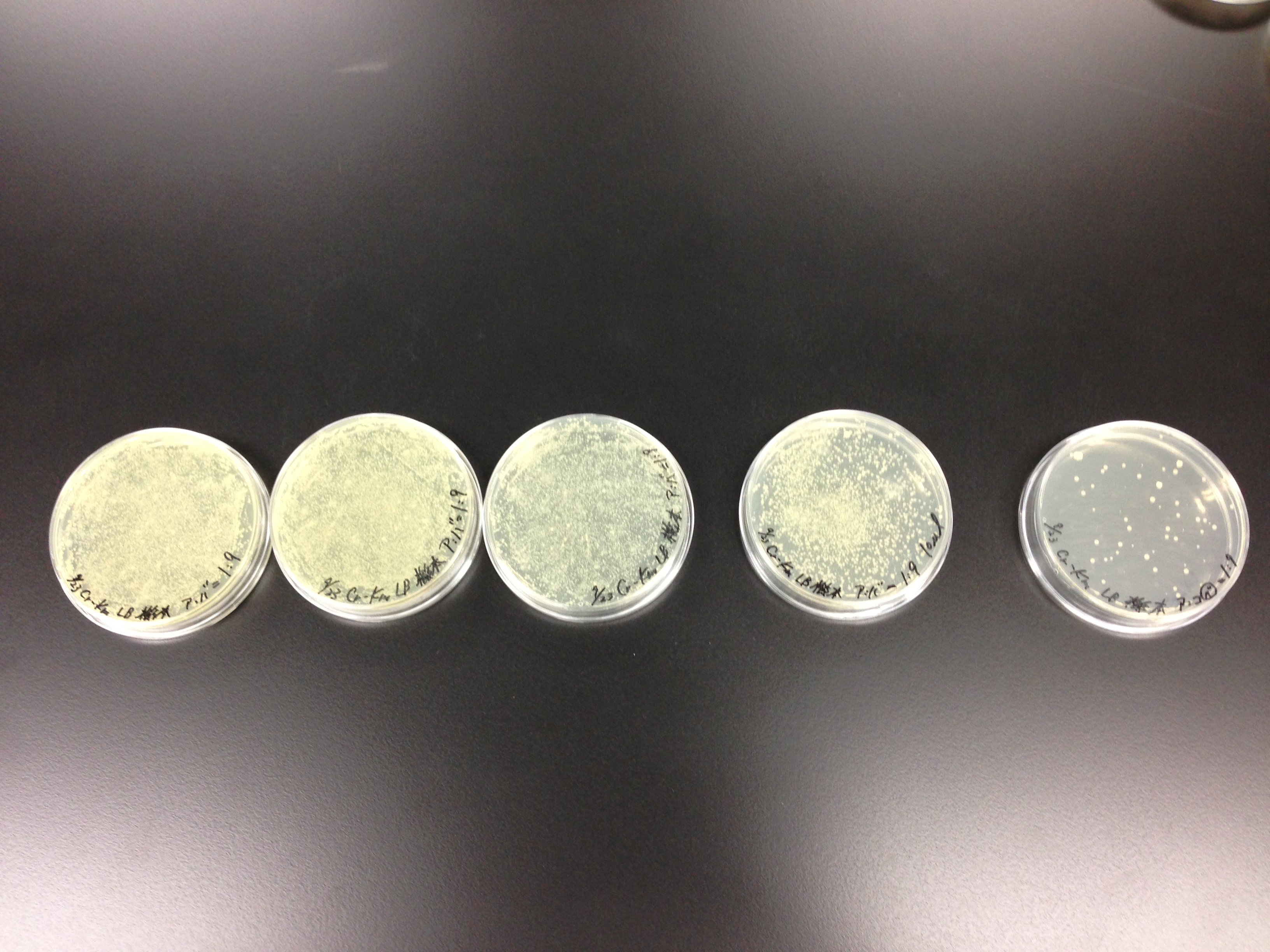Team:Biwako Nagahama/Human Practice
From 2013.igem.org
Kutsunosuke (Talk | contribs) (→UV.EM) |
(→Lake Biwa) |
||
| (10 intermediate revisions not shown) | |||
| Line 69: | Line 69: | ||
<p>Then,as What carried out filter sterilization processing of the bacterin solution, and was mixed at same rate.</p> | <p>Then,as What carried out filter sterilization processing of the bacterin solution, and was mixed at same rate.</p> | ||
<p></p> | <p></p> | ||
| - | [[File:Biwakonagahama_ninja_kusimoto1]]<br> | + | [[File:Biwakonagahama_ninja_kusimoto1.jpg|300px|]][[File:Biwakonagahama_ninja_kusimoto2.jpg|300px|]]<br> |
| + | <p>1:1 1:2</p> | ||
| + | [[File:Biwakonagahama_ninja_kusimoto3.jpg|300px|]][[File:Biwakonagahama_ninja_kusimoto4.jpg|300px|]]<br> | ||
| + | <p>2:1 9:1</p> | ||
| + | [[File:Biwakonagahama_ninja_kusimoto5.jpg|300px|]]<br> | ||
| + | <p>1:9</p> | ||
<p></p> | <p></p> | ||
<p>The percentages of 1:1 and 1:2 especially get results that an effect that Agrobacterium controls bacteria.</p> | <p>The percentages of 1:1 and 1:2 especially get results that an effect that Agrobacterium controls bacteria.</p> | ||
| Line 106: | Line 111: | ||
<hr size="1" color="#000000"> | <hr size="1" color="#000000"> | ||
<p>Sample Agro(μl) Ion-exchanged water(μl) Lake Biwa water(μl) Total(μl)</p> | <p>Sample Agro(μl) Ion-exchanged water(μl) Lake Biwa water(μl) Total(μl)</p> | ||
| + | <hr size="1" color="#000000"> | ||
<p> 1 20 80 0 100</p> | <p> 1 20 80 0 100</p> | ||
<p> 2 10 90 0 100</p> | <p> 2 10 90 0 100</p> | ||
| Line 122: | Line 128: | ||
<p><font size="6" color="FF6600">Result</font><br></p> | <p><font size="6" color="FF6600">Result</font><br></p> | ||
<hr size="1" color="#000000"> | <hr size="1" color="#000000"> | ||
| - | <p>Sample Number of colonies Concentration( | + | <p>Sample Number of colonies Concentration(Hp/L)</p> |
<hr size="1" color="#000000"> | <hr size="1" color="#000000"> | ||
| - | <p> | + | <p>1 729 29.16</p> |
| - | <p> | + | <p>2 187 7.48</p> |
| - | <p> | + | <p>3 2342 93.68 </p> |
| - | <p> | + | <p>4 1930 77.2</p> |
| - | <p> | + | <p>5 266 106.72</p> |
| - | <p> | + | <p>6 6 0.24</p> |
<hr size="1" color="#000000"> | <hr size="1" color="#000000"> | ||
<p></p> | <p></p> | ||
| Line 135: | Line 141: | ||
<p>But other bacteria increase preponderantly on LB plate.It ispresumed that the amount of Agroagainst Lake Biwa water it caused this result. </p> | <p>But other bacteria increase preponderantly on LB plate.It ispresumed that the amount of Agroagainst Lake Biwa water it caused this result. </p> | ||
<p></p> | <p></p> | ||
| - | <p><font size="5" color=" | + | <p><font size="5" color="000000">Reference</font><br></p> |
<p>Agrobacterium Protocols Second Edition Volume1 HUMANA PRESS Edited by Kan Wang</p> | <p>Agrobacterium Protocols Second Edition Volume1 HUMANA PRESS Edited by Kan Wang</p> | ||
Latest revision as of 01:48, 28 September 2013
Contents |
Human Practice
We carried out two activities, the first one ‘Ethics’ and second one ‘Safety, Security and Environment’ as our Human Practice’s activities. ‘Ethics’ is the introduction of synthetic biology through our team’s experiment priority. ‘Safety, Security and Environment’ are research of the environmental influences on the aquatic life of Lake Biwa when Agrobacterium gets into the water.
Ethics
The knowledge regarding synthetic biology and iGEM within the people of Japan is very low. So we want to increase the number of people with interests in synthetic biology and iGEM by introducing them to the people. By introducing synthetic biology in the national conference of Japan, we think that many problems relating to the lack of natural resources can resolved through development of synthetic biology. And, in iGEM2013, we performed two activities.
HP for high school teachers
Human practice for High school teachers
On the 15th of June 2013 team Biwako Nagahama organized an open conference for the high school teachers introducing and explaining about the iGEM.
The main objective behind the program was to introduce the high school teachers about synthetic biology and spread the information to the respective schools about iGEM and its programs expecting the participation of Japanese High school participation in the High School Category & tried to find out the cause for the lack knowledge and information about the High School competition.
We can expect great many things from the high school students if they could participate and experience the international competition from the high school level.
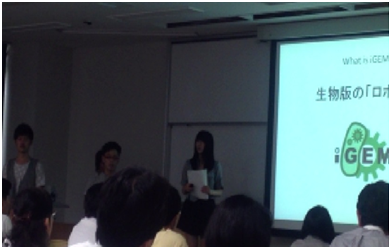
HP for elementary school students
We can simply feel that Japan is starting to get isolated in the development of science and technology. So we think that we have to close up the distance between other countries in the development on science and technology to broaden the concept of synthetic biology.
For the introduction of science and technology from the local level we felt the need of introduction and increase the interest from childhood itself. So we organized Waku-waku Town Fiesta at the Nagahama North Elementary School. The main objective of the Fiesta was to provide a chance to the children from lower level to get
intact with science from the early stage. The children had experienced the production of lime mixing detergent, colored water and adding Aqueous Borax solution to it. All the children who had theoretically learnt about the slime preparation in their class actively took part and enjoyed the program. We also had a brief session introducing about the synthetic biology but we felt that either it was too earlier to teach the children about the synthetic biology or our explaining methodology was too difficult for the elementary school to understand. So we have decided to organize more similar programs with more simple but interesting experiments which can be enjoyed by the children as well as increase their interest towards science and synthetic biology.
Enviroment
There is Lake Biwa which is the greatest lake in Japan close by our school. The water of Lake Biwa is used in the range wide as city-water. If bacteria should leak, it may be caused by an environmental problem. So, we make sure of bacteria measure in round environment when Agrobacterium tumefaciens leak out of labo. And, in order for us to know synthetic biology more, we do not transform by operating a plasmid but the simple method by UV irradiation. Then, we thought that it was easy to deepen an understanding. In this experiment, there must be few problems, even if bacteria escape. However,we thought that Agrobacterium which is soil bacteria, when it escapes in soil. Before that happens, we should take care of management of bacteria.
UV.EM
We checked whether Agrobacterium leaked into a open environment, survives or not and their struggle for existence with other bacterium.
So, we selected Effective Microorganisms (EM) as the living organism for the experiment We thought that of one bacillus gets weak,when Agrobacterium and EM were mixed in the culture medium.
For the survival of Agrobacterium with other bacterium, we made Agrobacterium of kanamycin(Km) and chloramphenicol(Cr) resistant variantwere.
Effective Microorgansims EM is a combination of useful regenerated micro-organisms that exist frealy in nature and are not manipulated in any way.
Symbiotic organisms such as Lactobacter, yeast etc are the major organisms categorized as Effective Microorganisms.
EM have been effectively used for compost to increase the fertility of soil by degrading the wastes.
So, we choiced EM as the compare living things.
We thought that that of one bacillus became weak,when Agrobacterium and EM※ were mixed in the culture medium.
In order to selection Agrobacterium with other bacterium, we made Agrobacterium of kanamycin(Km) and chloramphenicol(Cr) resistant variantwere.
※experiment 1
UV Add agrobacterium to the LB culture medium and allow to culture for two days at shaking chamber.
The LB medium is then treated with UV rays for around 17-18 seconds in order to get mutant strain.
The treated lb is then allowed to culture at 30℃ for 2 days.
Then the LB medium is treated with km(50µg/ml) and again kept at 30℃incubator for culturing.
Hence the km resistant strain is obtained.
Similarly 3µg/ml of Cr is added to the LB medium in order to get Cr resistant strains
※experiment 2 A struggle for existence of EM and Agrobacterium
Materials
Bacterin:The deodorizer using by EM of SUNMATE inc.
(http://www.sanmate.co.jp/item/index.html)
Bacterial culture of Agrobacterium(Km,Cr tolerance) and bacterin mixed at the rate of 1:1 ,1:2 ,2:1, 1:9 and 9:1.
And it shaking cultured in 24 hours at 30 ℃.
Then,as What carried out filter sterilization processing of the bacterin solution, and was mixed at same rate.
1:1 1:2
2:1 9:1
1:9
The percentages of 1:1 and 1:2 especially get results that an effect that Agrobacterium controls bacteria.
We thought that Agrobactrium could be weakened using by EM which many bacteria mixed.
But, the effect was weak.
We guessed that Agrobacterium co-existed with the bacteria used for a compost.
Because Agurobacterium is soil bacteria.
We can't check an effect that Agrobacterium controls bacteria.
In Japan, people do not have an understanding to transgenics.
It is regarded that transgenic things is so dangerous.
So, Like of this experiment, we change the character of a living thing without recombination, and let the public the difference from a recombination object know.
I would like to tie to an understanding of people's transgenics.
Lake Biwa
We performed experiments to confirm decrease or increase in surrounding environment when Agrobacterium tumefaciens we use leakage from lab.
Take charge of this experiments is first year students mainly.
In our college prohibit using genetically modified first year students.
Because they are inadequate for education and technique.
So we create a mutant of Agrobacterium tumefaciens with resistance Kanamycin and Chloramphenicol ,not to use genetically modified but project UV.
Sample
Water of Lake Biwa near the Saikati beach
Liquid LB medium,Solid LB medium
Creature
a mutant of Agrobacterium tumefaciens with resistance Kanamycin and Chloramphenicol.The following Agro.
Protocol
↓Inoculated Agro with Liquid LB medium 1ml and after shaking culture overnight(shake130/min temperature 30℃)
↓Dilute 100times Agro 5µl with liquid LB medium and again Dilute 100times earlier Agro 20µl with liquid LB medium
↓Plated culture on LB plate and two days later count the colonies.
↓Divided into five samples following the Agro diluted ten thousand times.
Sample Agro(μl) Ion-exchanged water(μl) Lake Biwa water(μl) Total(μl)
1 20 80 0 100
2 10 90 0 100
3 80 0 20 100
4 60 0 40 100
5 70 0 30 100
6 0 0 100 100
Sample1,2、6is control。
↓Plated on LB plates and other take Ampicillin(50µg/ml),Kanamycin (50µg/ml),Chloramphenicol(3µg/ml) in LB plates by 25µl respectively,which were cultured.
↓Put in an incubator at 30℃ for two days.
↓Count the colonies of six samples then confirmation of Agro is decrease or not.
Result
Sample Number of colonies Concentration(Hp/L)
1 729 29.16
2 187 7.48
3 2342 93.68
4 1930 77.2
5 266 106.72
6 6 0.24
Sample 1 and 2 compared with result of sample3~5 ,Agro’s concentration is increase on Ampicillin(50µg/ml),Kanamycin (50µg/ml),Chloramphenicol(3µg/ml) in LB plates.So number of Agro has increase.
But other bacteria increase preponderantly on LB plate.It ispresumed that the amount of Agroagainst Lake Biwa water it caused this result.
Reference
Agrobacterium Protocols Second Edition Volume1 HUMANA PRESS Edited by Kan Wang
 "
"
